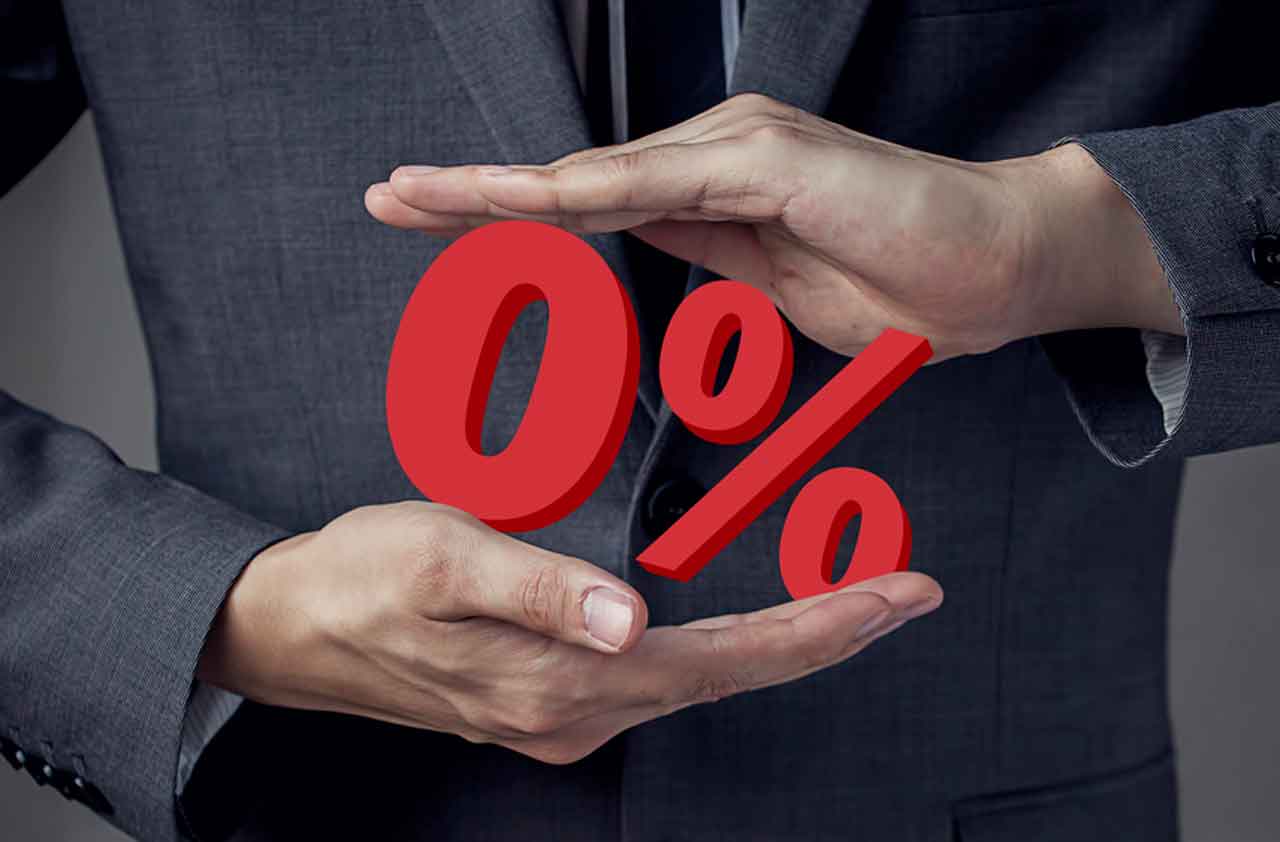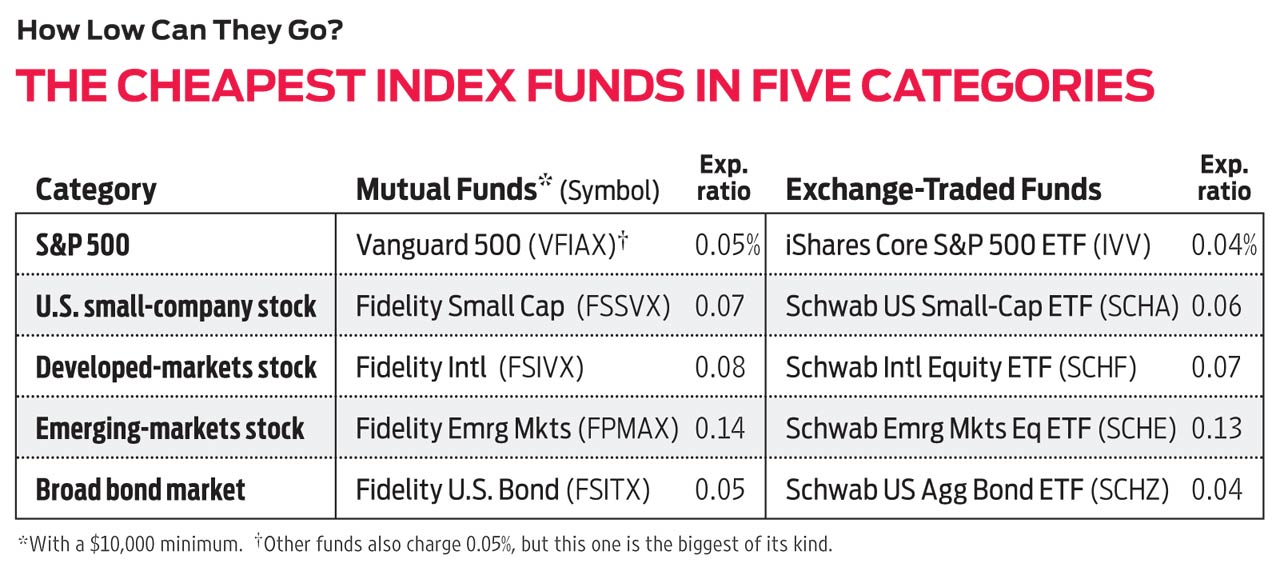Fund Fee Wars Heat Up
Expense ratios for some funds are rapidly approaching zero.


Profit and prosper with the best of Kiplinger's advice on investing, taxes, retirement, personal finance and much more. Delivered daily. Enter your email in the box and click Sign Me Up.
You are now subscribed
Your newsletter sign-up was successful
Want to add more newsletters?

Delivered daily
Kiplinger Today
Profit and prosper with the best of Kiplinger's advice on investing, taxes, retirement, personal finance and much more delivered daily. Smart money moves start here.

Sent five days a week
Kiplinger A Step Ahead
Get practical help to make better financial decisions in your everyday life, from spending to savings on top deals.

Delivered daily
Kiplinger Closing Bell
Get today's biggest financial and investing headlines delivered to your inbox every day the U.S. stock market is open.

Sent twice a week
Kiplinger Adviser Intel
Financial pros across the country share best practices and fresh tactics to preserve and grow your wealth.

Delivered weekly
Kiplinger Tax Tips
Trim your federal and state tax bills with practical tax-planning and tax-cutting strategies.

Sent twice a week
Kiplinger Retirement Tips
Your twice-a-week guide to planning and enjoying a financially secure and richly rewarding retirement

Sent bimonthly.
Kiplinger Adviser Angle
Insights for advisers, wealth managers and other financial professionals.

Sent twice a week
Kiplinger Investing Weekly
Your twice-a-week roundup of promising stocks, funds, companies and industries you should consider, ones you should avoid, and why.

Sent weekly for six weeks
Kiplinger Invest for Retirement
Your step-by-step six-part series on how to invest for retirement, from devising a successful strategy to exactly which investments to choose.
Good news for investors: Fund fees keep dropping. The expense ratios of some exchange-traded funds are now approaching zero. What’s more, some mutual fund sponsors that have traditionally charged commissions have begun making their funds available without loads.
BlackRock, sponsor of the iShares exchange-traded funds, cut the expense ratios for 15 of its broad-market ETFs and five of its index mutual funds in October. Schwab retaliated soon thereafter, trimming fees for five of its ETFs. Last summer, Fidelity cut fees for 27 of its funds and ETFs. It now charges less for some of its index funds than does Vanguard, the indexing leader (see Fidelity Challenges Vanguard on Mutual Fund Fees). BlackRock’s latest move makes iShares Core S&P 500 (symbol IVV), which charges 0.04% annually, the lowest-cost ETF that tracks Standard & Poor’s 500-stock index. (The fund is a member of the Kiplinger ETF 20.)
The big news on the commission front comes out of Los Angeles, home to the American Funds, the nation’s second-largest fund sponsor, with nearly $1.3 trillion in assets. Since the early 1930s, Capital Group, American’s sponsor, has sold its funds exclusively through investment advisers and brokers, who charge a commission of up to 5.75%. But in October, Capital made the F1 share class of each of the American Funds available commission-free to investors on the Fidelity and Schwab online brokerage sites. “The ability for investors to stay with American Funds, particularly when they roll over 401(k) retirement savings from an employee-sponsored plan to an IRA, is important,” says Hannah Coan, a Capital Group spokesperson. American joins other formerly pure load shops, including J.P. Morgan, Morgan Stanley and Oppenheimer, in offering their funds load-free at selected online brokers.
From just $107.88 $24.99 for Kiplinger Personal Finance
Become a smarter, better informed investor. Subscribe from just $107.88 $24.99, plus get up to 4 Special Issues

Sign up for Kiplinger’s Free Newsletters
Profit and prosper with the best of expert advice on investing, taxes, retirement, personal finance and more - straight to your e-mail.
Profit and prosper with the best of expert advice - straight to your e-mail.
The Department of Labor’s new fiduciary rule, which is slated to go into effect in April, may be responsible for some of the price cuts. The regulation would require financial professionals who offer investors advice on retirement accounts to put their clients’ best interests ahead of their own. (Brokers are now required merely to offer recommendations that are “suitable” for their clients, a looser standard.)
The case for ETFs. BlackRock and others think the new standard will push advisers to focus more on costs and, consequently, look more favorably toward ETFs, most of which track indexes and charge low fees. Says Martin Small, head of U.S. iShares at BlackRock: “If you’re holding for the long term, you really care most about the expense ratio.”
Why do costs matter so much? It’s one of the few aspects of investing that you can control. All things being equal, the less you pay in fees, the more of a fund’s earnings are left for you. “Lower costs mean better returns and a greater ability for investors to meet their financial goals,” says Joel Dickson, Vanguard’s head of investment research and development. In fact, fees have been falling for years.
But fees aren’t everything. Unless you are comparing funds that track the same index, you need to look beyond expense ratios, says Todd Rosenbluth, head of fund research at CFRA, a research firm. Take iShares Core MSCI Emerging Markets ETF (IEMG) and Vanguard FTSE Emerging Markets ETF (VWO). The iShares ETF costs 0.01 percentage point less than the Vanguard ETF. But the funds track different indexes. The iShares ETF holds Korean stocks but does not hold Chinese A-share stocks, which are traded in yuan, the local currency. VWO holds a handful of Chinese A-share stocks but no Korean securities. “Investors need to look beyond just one data point when making decisions,” Rosenbluth says.

Profit and prosper with the best of Kiplinger's advice on investing, taxes, retirement, personal finance and much more. Delivered daily. Enter your email in the box and click Sign Me Up.

Nellie joined Kiplinger in August 2011 after a seven-year stint in Hong Kong. There, she worked for the Wall Street Journal Asia, where as lifestyle editor, she launched and edited Scene Asia, an online guide to food, wine, entertainment and the arts in Asia. Prior to that, she was an editor at Weekend Journal, the Friday lifestyle section of the Wall Street Journal Asia. Kiplinger isn't Nellie's first foray into personal finance: She has also worked at SmartMoney (rising from fact-checker to senior writer), and she was a senior editor at Money.
-
 How Much It Costs to Host a Super Bowl Party in 2026
How Much It Costs to Host a Super Bowl Party in 2026Hosting a Super Bowl party in 2026 could cost you. Here's a breakdown of food, drink and entertainment costs — plus ways to save.
-
 3 Reasons to Use a 5-Year CD As You Approach Retirement
3 Reasons to Use a 5-Year CD As You Approach RetirementA five-year CD can help you reach other milestones as you approach retirement.
-
 Your Adult Kids Are Doing Fine. Is It Time To Spend Some of Their Inheritance?
Your Adult Kids Are Doing Fine. Is It Time To Spend Some of Their Inheritance?If your kids are successful, do they need an inheritance? Ask yourself these four questions before passing down another dollar.
-
 The 5 Best Actively Managed Fidelity Funds to Buy and Hold
The 5 Best Actively Managed Fidelity Funds to Buy and Holdmutual funds Sometimes it's best to leave the driving to the pros – and these actively managed Fidelity funds do just that, at low costs to boot.
-
 The 12 Best Bear Market ETFs to Buy Now
The 12 Best Bear Market ETFs to Buy NowETFs Investors who are fearful about the more uncertainty in the new year can find plenty of protection among these bear market ETFs.
-
 Don't Give Up on the Eurozone
Don't Give Up on the Eurozonemutual funds As Europe’s economy (and stock markets) wobble, Janus Henderson European Focus Fund (HFETX) keeps its footing with a focus on large Europe-based multinationals.
-
 Vanguard Global ESG Select Stock Profits from ESG Leaders
Vanguard Global ESG Select Stock Profits from ESG Leadersmutual funds Vanguard Global ESG Select Stock (VEIGX) favors firms with high standards for their businesses.
-
 Kip ETF 20: What's In, What's Out and Why
Kip ETF 20: What's In, What's Out and WhyKip ETF 20 The broad market has taken a major hit so far in 2022, sparking some tactical changes to Kiplinger's lineup of the best low-cost ETFs.
-
 ETFs Are Now Mainstream. Here's Why They're So Appealing.
ETFs Are Now Mainstream. Here's Why They're So Appealing.Investing for Income ETFs offer investors broad diversification to their portfolios and at low costs to boot.
-
 Do You Have Gun Stocks in Your Funds?
Do You Have Gun Stocks in Your Funds?ESG Investors looking to make changes amid gun violence can easily divest from gun stocks ... though it's trickier if they own them through funds.
-
 How to Choose a Mutual Fund
How to Choose a Mutual Fundmutual funds Investors wanting to build a portfolio will have no shortage of mutual funds at their disposal. And that's one of the biggest problems in choosing just one or two.